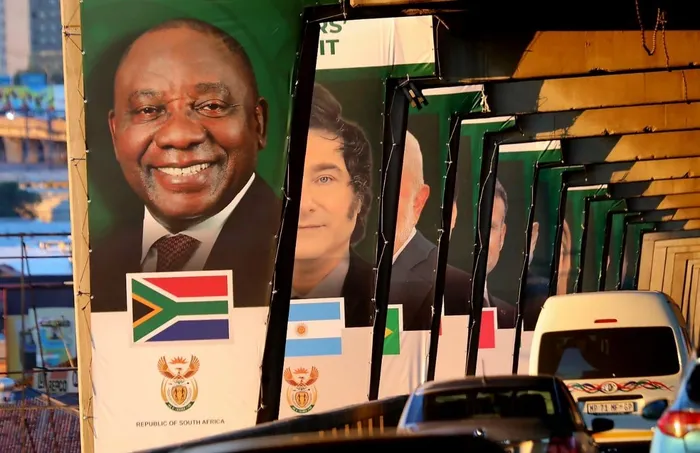
The G20’s adoption of the leaders’ declaration, which led to South Africa securing an overwhelming consensus, surprised many observers after the US opposed and boycotted the summit.
Image: Timothy Bernard / Independent Newspapers
The G20’s adoption of the leaders’ declaration, which led to South Africa securing an overwhelming consensus, came as a surprise to many observers after the US opposed and boycotted the summit that was held in Johannesburg.
US President Donald Trump boycotted the G20 summit in South Africa due to false allegations of human rights abuse and claims of “genocide” against white Afrikaaners. He also opposed the country’s agenda, which focused heavily on climate change and global wealth inequality.
The boycott occurred amid existing diplomatic tensions between the US and South Africa, with some US officials accusing South Africa of anti-Americanism due to its diplomatic ties with Russia and China.
The US, in its attempt to block a joint declaration, applied intense diplomatic pressure on other G20 nations, using formal diplomatic notes to demand that South Africa only issue a “Chair’s Statement” (which reflects a lack of consensus) instead of a Leaders’ Declaration. The US argued that any declaration without its agreement, would be null and void.
However, despite the US pressure, the G20 leaders, including Canada, France, Germany, Russia the United Kingdom (UK), and Brazil, adopted a declaration.
Argentina’s President Javier Milei, Trump’s ally, also skipped the summit and his foreign minister initially withdrew from final negotiations, citing objections to language regarding the Middle East conflict. It is believed that this was emboldened by the US position.
Saudi Arabia reportedly raised objections to specific agenda points concerning renewable energy, a stance also perceived to be influenced by the US's pro-fossil fuel stance.
South Africa also centred its agenda on issues such as global inequality, debt relief for developing countries and African development.
Professor Theo Neethling, head of the Department of Political Studies and Governance at the University of Free State, said the adoption of a leaders’ declaration on the opening day of the 2025 Johannesburg summit came as a notable surprise to many observers, especially in light of the public boycott and vocal opposition from the US.
He said that the dynamics behind this outcome reveal important shifts in global diplomacy.
“For one, the host nation under President Cyril Ramaphosa held an unusually firm line, insisting throughout the year that South Africa would not be bullied,” Neethling said.
He said the declaration’s successful adoption, despite overt US pressure, was widely read as proof that multilateral cooperation remains possible even in the face of resistance from the US as a superpower, and Argentina as a G20 member and strong ally of Trump’s administration.
“It should be understood that Trump has increasingly alienated large parts of Europe. His confrontational approach to NATO (North Atlantic Treaty Organisation), his insistence that he would not necessarily defend European allies, and his open scepticism about the US commitment to collective defence have cast serious doubt on Washington’s reliability.”
“In his (previous) term, Trump’s repeated accusations that European NATO members were ‘not paying their share’ strained relations with long-standing partners such as Germany, France and Canada. While Europe had been under pressure to boost defence spending even before Trump, his rhetoric was unusually blunt - at times confrontational, even demeaning.”
Neethling added that beyond NATO tensions, Trump’s tariffs on European exports and his dismissive posture toward multilateral institutions deepened European mistrust.
“His refusal to treat the EU as a strategic ally, combined with tariffs on European steel and aluminium, cemented the perception that the US under Trump had abandoned its traditional role as a predictable economic partner ”
The adopted declaration addressed issues such as tackling global inequality, reforming international financial systems, easing debt pressures on developing countries, and boosting inclusive growth, with a strong focus on Africa and the broader Global South.
It also included the threat of climate change, a topic the US administration had opposed.
Andile Lungisa, an ANC National Executive Committee member and the party’s sub-committee member on International Relations, said the summit has also shown that a multipolar world is in action, adding that the dominant power is no longer in control.
Lungisa said this also demonstrated that the G20 can move smoothly without the participation of the US.
“They (US) do not want this global shift that is taking place, and they want to remain as a dominant force,” he said.
manyane.manyane@inl.co.za
Related Topics: